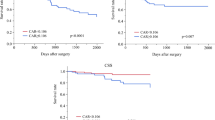Abstract
Objective
This study was designed to estimate the clinical significance of the C-reactive protein (CRP)/albumin ratio (CAR) for prediction of postoperative survival in patients with colorectal cancer (CRC).
Background
The Glasgow Prognostic Score (GPS), calculated from the serum levels of CRP and albumin, is well known to be a valuable inflammation-based prognostic system for several types of cancer. A recent study has demonstrated that the CAR is also useful for prediction of treatment outcome in patients with hepatocellular carcinoma.
Methods
Uni- and multivariate analyses using the Cox proportional hazards model were performed to detect the clinical characteristics that were most closely associated with overall survival (OS). All recommended cutoff values were defined using receiver operating characteristic curve analyses. Kaplan–Meier analysis was used to compare OS curves between the two groups.
Results
A total of 627 patients who had undergone elective CRC surgery were enrolled. Multivariate analysis using the results of univariate analyses demonstrated that CAR (>0.038/≤0.038) was associated with OS (hazard ratio 2.596; 95 % confidence interval 1.603–4.204; P < 0.001) along with pathological differentiation (others/well or moderately), carcinoembryonic antigen level (>8.7/≤8.7, ng/ml), stage (III, IV/0, I, II), neutrophil to lymphocyte ratio (NLR) (>2.9/≤2.9), and GPS (2/0, 1). Kaplan–Meier analysis and log rank test demonstrated a significant difference in OS curves between patients with low CAR (≤0.038) and those with high CAR (>0.038; P < 0.001).
Conclusions
CAR is as useful for predicting the postoperative survival of patients with CRC as previously reported inflammation-based prognostic systems, such as GPS and NLR.


Similar content being viewed by others
References
McMillan DC. The systemic inflammation-based Glasgow Prognostic Score: a decade of experience in patients with cancer. Cancer Treat Rev. 2013;39:534–40.
Guthrie GJ, Charles KA, Roxburgh CS, Horgan PG, McMillan DC, Clarke SJ. The systemic inflammation-based neutrophil-lymphocyte ratio: experience in patients with cancer. Crit Rev Oncol Hematol. 2013;88:218–30.
Forrest LM, McMillan DC, McArdle CS, Angerson WJ, Dunlop DJ. Comparison of an inflammation-based prognostic score (GPS) with performance status (ECOG) in patients receiving platinum-based chemotherapy for inoperable non-small-cell lung cancer. Br J Cancer. 2004;90:1704–6.
Ishizuka M, Nagata H, Takagi K, Horie T, Kubota K. Inflammation-based prognostic score is a novel predictor of postoperative outcome in patients with colorectal cancer. Ann Surg. 2007;246:1047–51.
Templeton AJ, McNamara MG, Seruga B, et al. Prognostic role of neutrophil-to-lymphocyte ratio in solid tumors: a systematic review and meta-analysis. J Natl Cancer Inst. 2014;106:dju124.
Kinoshita A, Onoda H, Imai N, et al. The C-reactive protein/albumin ratio, a novel inflammation-based prognostic score, predicts outcomes in patients with hepatocellular carcinoma. Ann Surg Oncol. 2015;22:803–10.
Polat E, Duman U, Duman M, et al. Diagnostic value of preoperative serum carcinoembryonic antigen and carbohydrate antigen 19-9 in colorectal cancer. Curr Oncol. 2014;21:e1–7.
Watt DG, Martin JC, Park JH, Horgan PG, McMillan DC. Neutrophil count is the most important prognostic component of the differential white cell count in patients undergoing elective surgery for colorectal cancer. Am J Surg. 2015. 210:24–30
Watanabe T, Itabashi M, Shimada Y, et al. Japanese Society for Cancer of the Colon and Rectum (JSCCR) guidelines 2010 for the treatment of colorectal cancer. Int J Clin Oncol. 2012;17:1–29.
Watanabe T, Itabashi M, Shimada Y, et al. Japanese Society for Cancer of the Colon and Rectum (JSCCR) Guidelines 2014 for treatment of colorectal cancer. Int J Clin Oncol. 2015. 20:207–39
Youden WJ. Index for rating diagnostic tests. Cancer. 1950;3:32–35.
Ishizuka M, Nagata H, Takagi K, Iwasaki Y, Shibuya N, Kubota K. Clinical significance of tumor pathology for postoperative survival of patients undergoing surgery for stage IV colorectal cancer. Anticancer Res. 2012;32:3291–7.
Ishizuka M, Nagata H, Takagi K, Iwasaki Y, Kubota K. Inflammation-based prognostic system predicts postoperative survival of colorectal cancer patients with a normal preoperative serum level of carcinoembryonic antigen. Ann Surg Oncol. 2012;19:3422–31.
Watt DG, Horgan PG, McMillan DC. Routine clinical markers of the magnitude of the systemic inflammatory response after elective operation: a systematic review. Surgery. 2015;157:362–80.
Roxburgh CS, McMillan DC. Role of systemic inflammatory response in predicting survival in patients with primary operable cancer. Future Oncol. 2010;6:149–63.
Park JH, Watt DG, Roxburgh CS, Horgan PG, McMillan DC. Colorectal cancer, systemic inflammation, and outcome: staging the tumor and staging the host. Ann Surg. 2015. doi:10.1097/SLA.0000000000001122.
Laird BJ, Kaasa S, McMillan DC, et al. Prognostic factors in patients with advanced cancer: a comparison of clinicopathological factors and the development of an inflammation-based prognostic system. Clin Cancer Res. 2013;19:5456–64.
Ishizuka M, Kita J, Shimoda M, Kato M, Sawada T, Kubota K. Impact of grading of liver metastasis on postoperative outcome in patients with liver metastases from colorectal cancer. Hepatogastroenterology. 2012;59:54–8.
Acknowledgment
We received no funding/grant support for this study.
Disclosure
We have no conflicts of interest to declare.
Author information
Authors and Affiliations
Corresponding author
Rights and permissions
About this article
Cite this article
Ishizuka, M., Nagata, H., Takagi, K. et al. Clinical Significance of the C-Reactive Protein to Albumin Ratio for Survival After Surgery for Colorectal Cancer. Ann Surg Oncol 23, 900–907 (2016). https://doi.org/10.1245/s10434-015-4948-7
Received:
Published:
Issue Date:
DOI: https://doi.org/10.1245/s10434-015-4948-7




